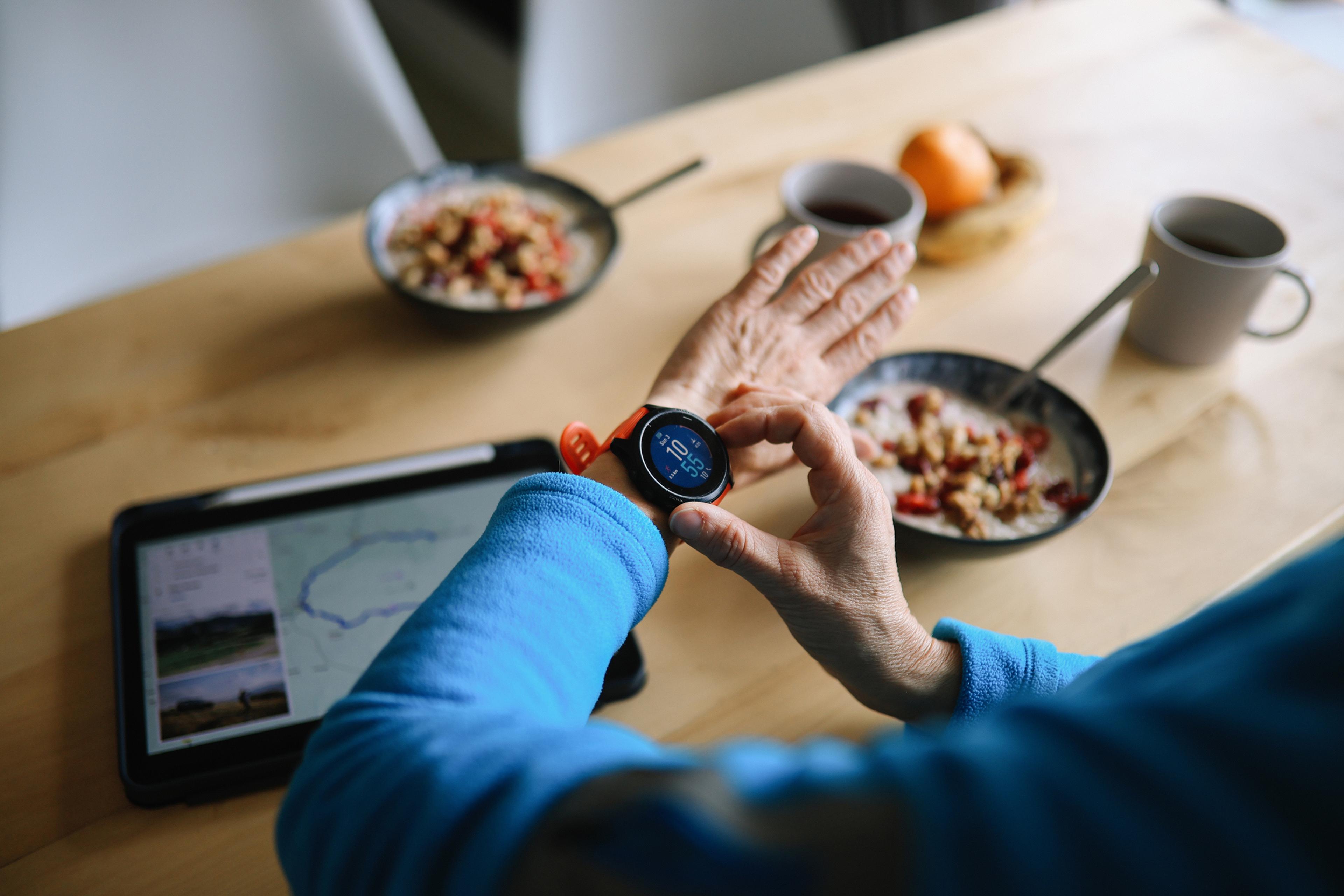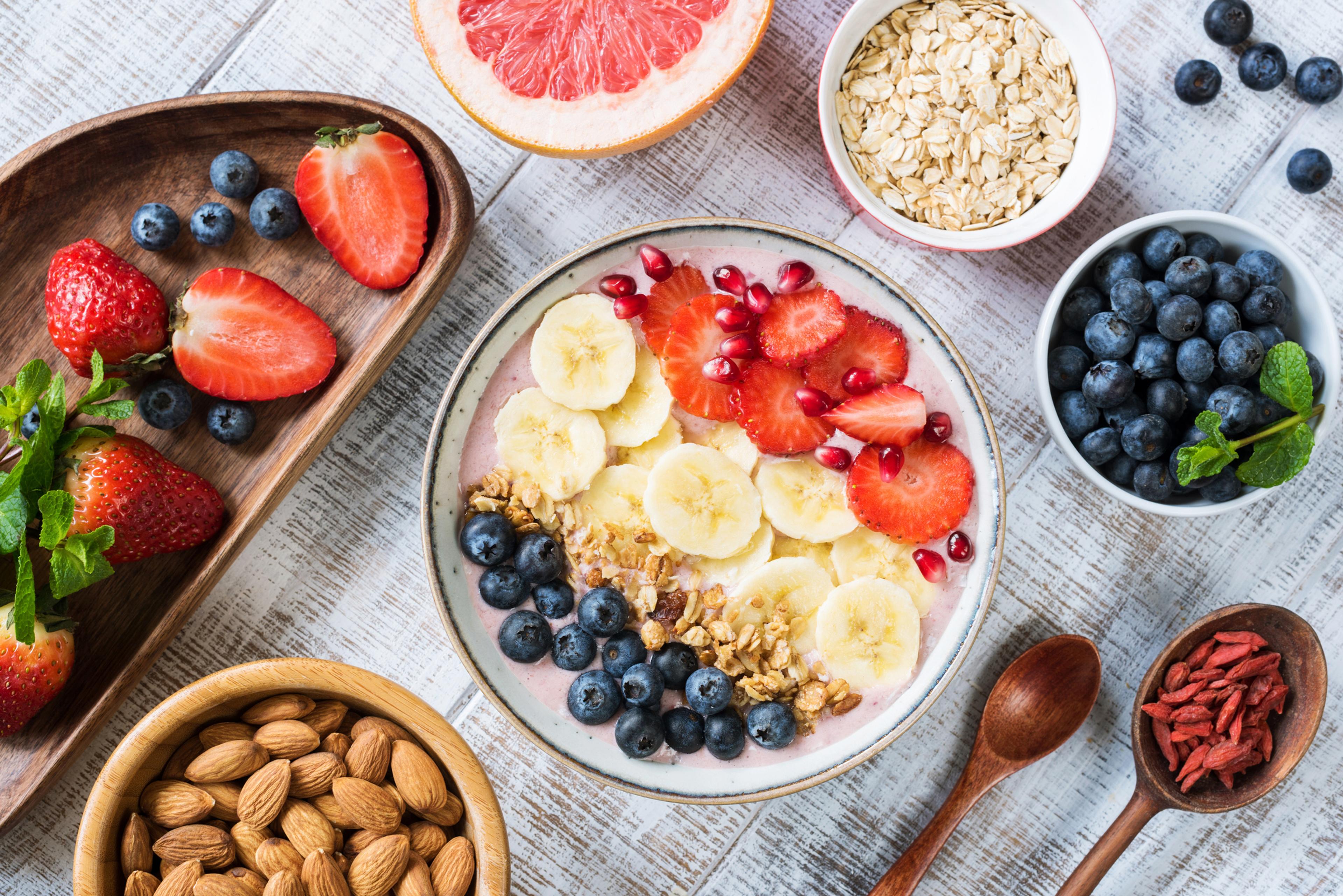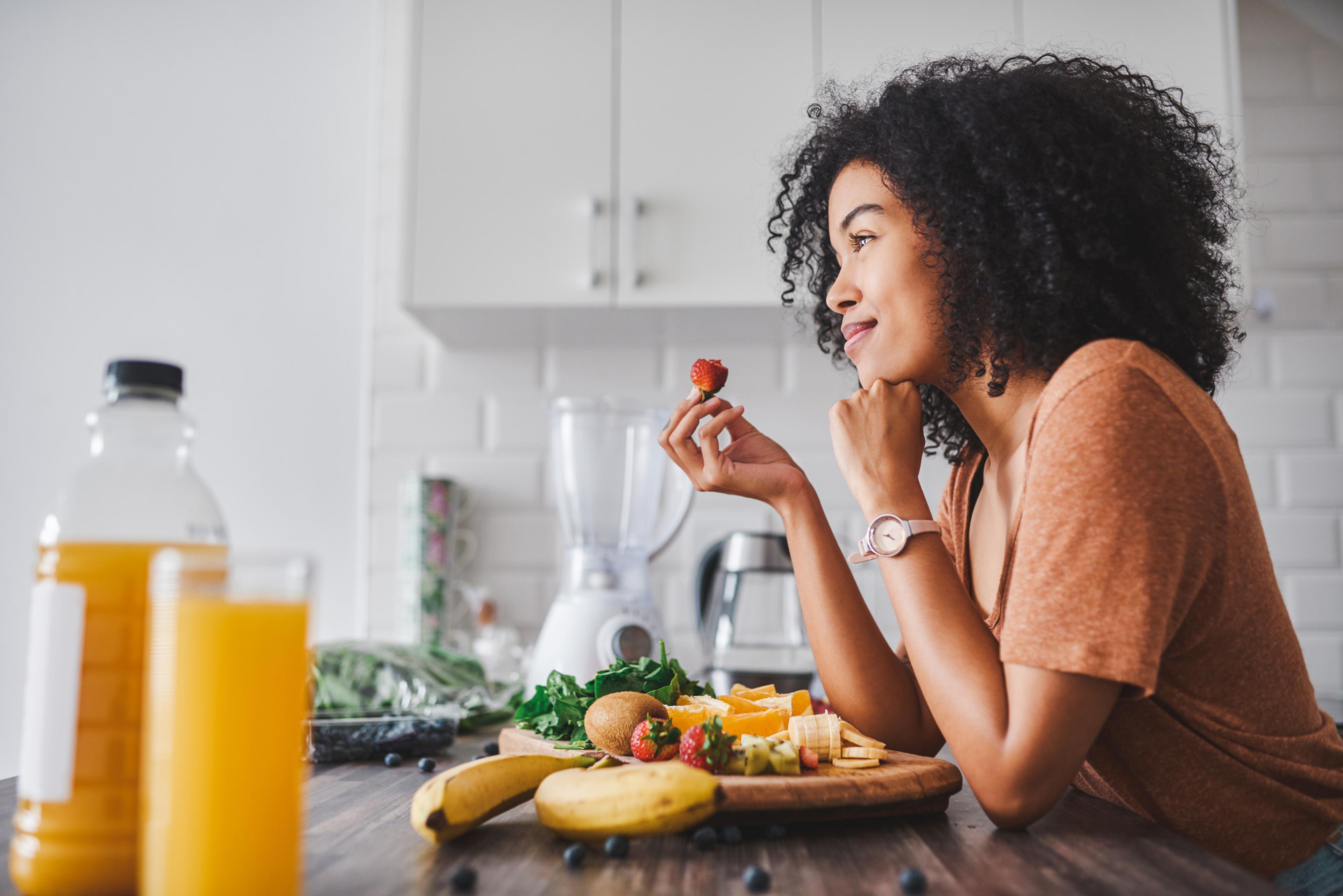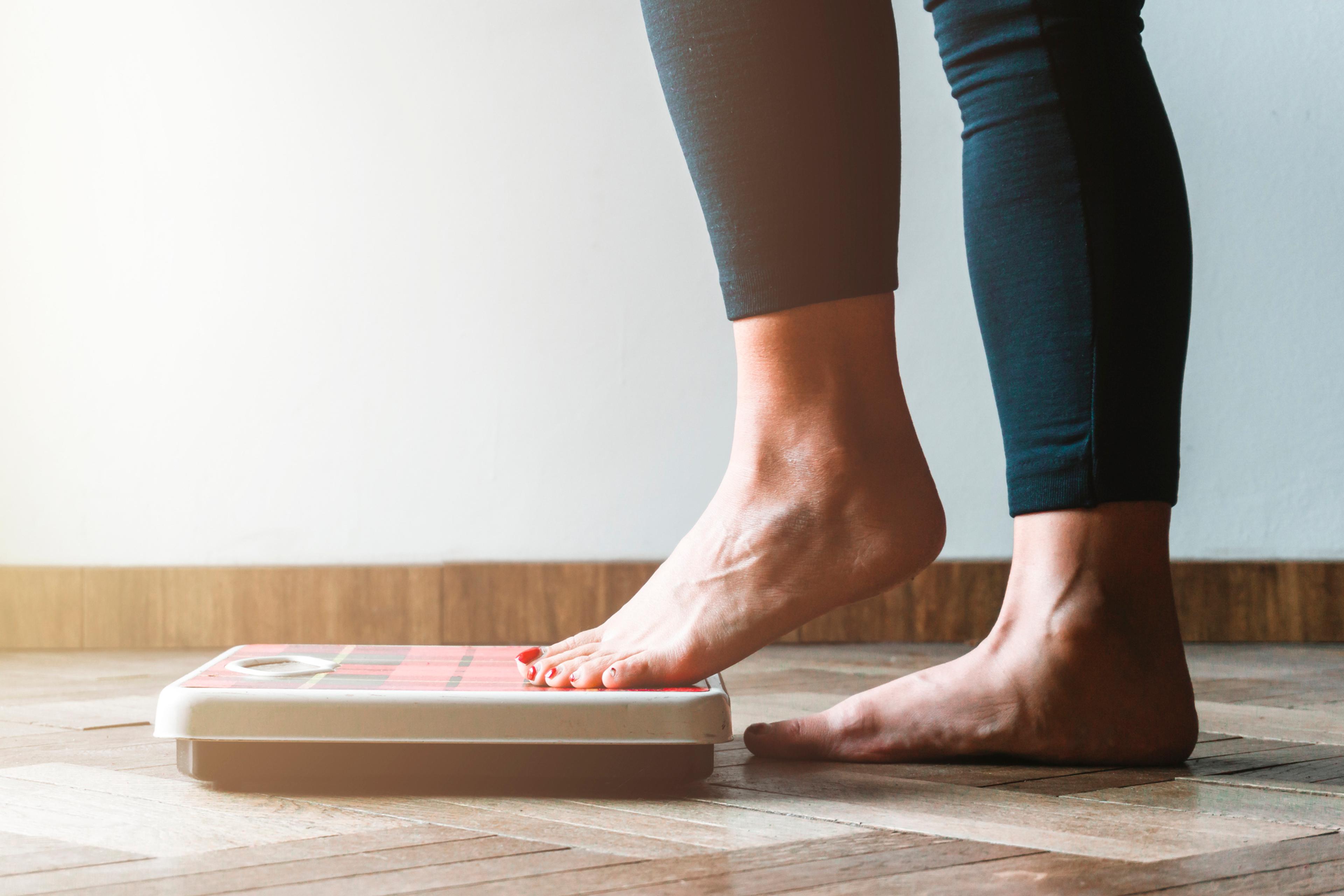Is My Diet Affecting My Heart Health?
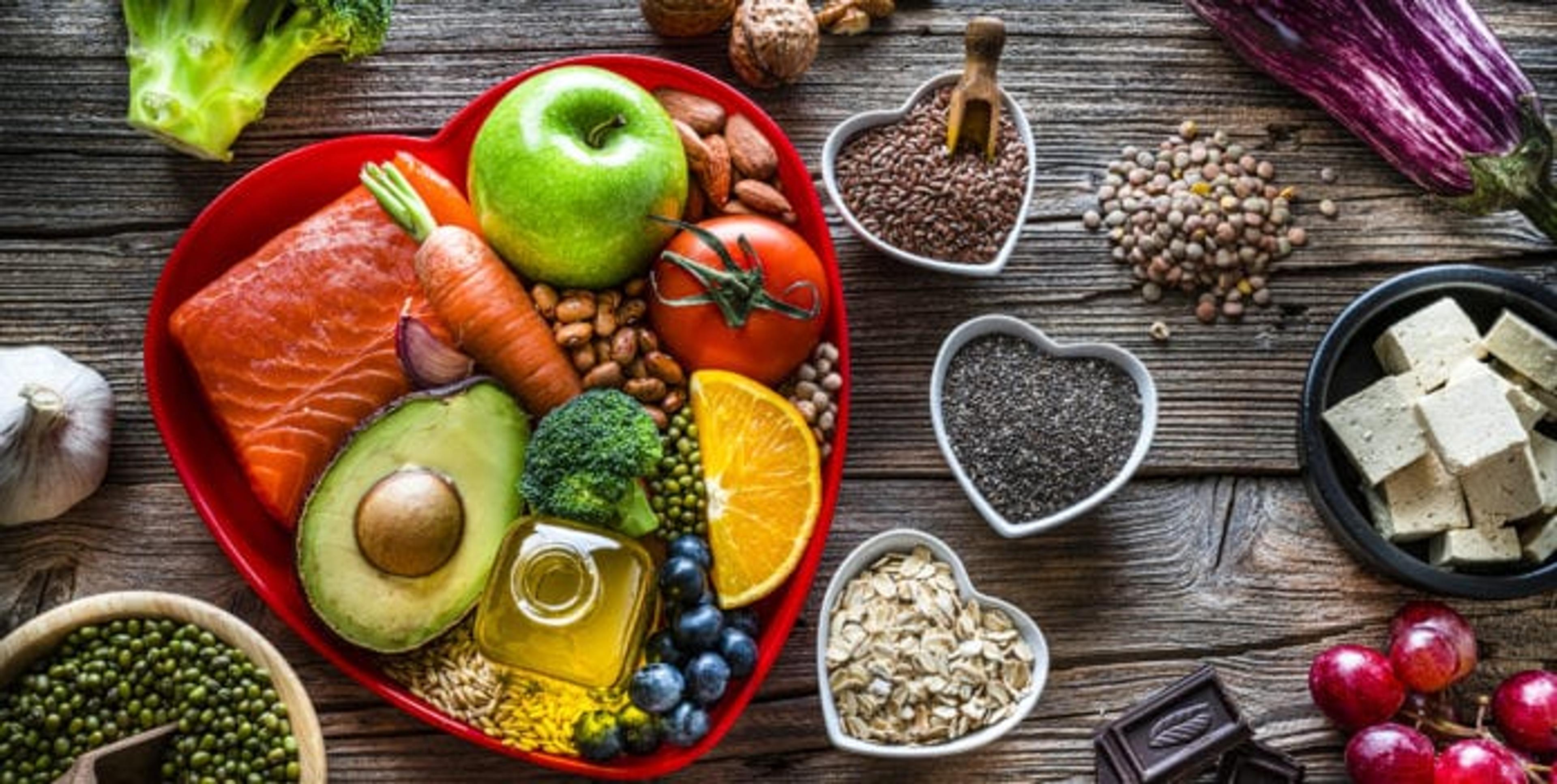
00:00
00:00
About the Show
- The impact diet culture has on our overall health goals.
- Pros and cons of popular diets in relation to our heart health.
- Food deprivation and maintaining self-awareness.
- Tried and true diets that positively impact our health.
Transcript
Here is the full transcript of this episode. You can listen to the audio version on streaming platforms or watch on YouTube.
This is A Healthier Michigan Podcast, episode 74. Coming up, we discuss ways our diet may be effecting our heart health.
Welcome to A Healthier Michigan Podcast. This podcast is dedicated to navigating how we can all improve our health and well-being through small, healthy habits we can start implementing right now. I’m your host, Chuck Gaidica. Every other week, we sit down with a certified expert from Blue Cross Blue Shield of Michigan and we dive into topics that cover nutrition, and fitness, and a whole lot more. On this episode, it’s a good time to discuss heart health, which we’ll get into because this is American Heart Month, which means we should all be focused on doing good stuff, right? As we know, diets will impact our heart health directly, and sometimes it’s for the good, sometimes it’s for the bad. With us today, registered dietitian from Blue Cross Blue Shield of Michigan, Shanthi Appelo. Good to have you with us.
Great to be back, Chuck.
Well, you have made your way from your native Sweden through Tennessee, and you’re just a passionate clinician in nutrition, public health. You’re a teacher in your free time. I know you enjoy the outdoors, but we want to jump in here on talking about diets, because everywhere you go, it seems like you see stuff, whether it’s the checkout line at the grocery store and it’s on magazines, it’s the latest diet to drop 10 pounds, you know what I mean?
Mm-mmm. (affirmative).
I mean, we’re just inundated with all these kinds of diets. So we live in this world where, and I used to make a joke back in the day, there were only a couple of diets. I’m on two diets because I only get enough food with one. It’s kind of funny, but when you think about it, I don’t know about you, but for me, I’ve gone on a low carb, low fat thing for 10 days. And it’s like, “I lost half a pound.” Maybe I should try keto. And then maybe I should try this thing. So talk us through this idea. Sometimes we fall into this trap of focusing on the final result, what that diet in the magazine or something tells us. What should we really be thinking about upfront when it comes to diet?
I think we need to start by just being realistic with ourselves. We need to think about the fact that we just can’t lose 40 pounds in a healthy way in a month. There’s just no way to do that.
Yeah.
I think another important aspect of thinking about our health is that we may be happy with quick results, but what is it doing to our health in the long-term? Because sometimes, we might be damaging our health without us even feeling it to begin with. So I think a really good way to just think about it is to put yourself in the mindset where food is fuel. Food can also be something that you can enjoy, but really switching our mindset to, we have to earn what we eat, that we have to exercise to earn what we’re putting in our bodies. Our bodies function and they deserve fuel to function. So I think this diet culture, I really liked that in the past couple of years, it’s really been called to attention that we need to stop just thinking about quick fixes to get to the destination where we want, because I’m going to say something really unpopular right now.
Okay.
But once we get to our end goal, we actually have to continue to work hard.
Yeah. It’s a lifelong process, isn’t it?
Yes, and that’s why I’m not going to sound like a broken record. That’s why we have to think of diets as a lifestyle change. We really do because once we get to our end results, that doesn’t mean we can stop doing our hard work.
Well, I know there’s a growing effort even within the medical community, which I’m sure you’re aware that we say lifestyle medicine now. There are a lot of physicians who are finally not just flying through the room and seeing it and going, “You need to lose 15 pounds and just do this, and jog a little bit.” They’re really dealing with this idea that you’ve got to change your lifestyle and a key component of that is diet, right? That’s what you put in your mouth.
Absolutely. What I’ve seen too from physicians is that physicians are doing a much better job at setting goals for patients that are realistic, and that’s part of it. If a physician tells you, you need to lose 40 pounds, that can be extremely frustrating if you don’t get to that point very soon. So if we can start with five pound increments and you’re getting that kind of support from your physician, that’s going to be much better in the long run. Otherwise, we kind of end up with this yo-yo diet. So I think it’s the role of healthcare professionals who are supporting you in the process, but also the persons that’s losing weight to really think about being realistic.
I knew a guy just a few years ago who went on a keto thing. I don’t really relate to that. I’ve tried it in spurts, or I try to add a little more of this or that. This guy was one of the extremists, right? So he’s eating all this high-fat stuff. A snack for him was like three giant long processed meat sticks, right? And he’s dropping weight right before my eyes. Well, you come back about 90 days later and the boomerang that came back on this guy, so it wasn’t just that he was losing significant pounds. I mean, it was visible within a two weeks to a month, but there is this idea that when you’re pointing out that we could drop weight too fast, there could be negative effects, maybe ignoring our overall health and the process.
Yeah, absolutely. I think what’s really important with that too, is that extremely restrictive diets, like the keto diet that we spike back once we’re kind of done, we’ve gotten to our end result, or we’re wanting that thing that we’ve craved for so long, yo-yo dieting can actually be strainful on our heart health. I think that’s something really important to remember.
There’s this really interesting study. I think it was posted in 2017, so four years ago now, but it was a really interesting study because they looked at about 10,000 people and it was a retrospective study. So I should note that there’s an association here, but there’s not a cause and effect, right? But they looked at people who already had pre-existing heart conditions and saw those that fluctuated in weight more. So let’s just say the average was 8.2 pounds, versus those that fluctuated in weight with two pounds had double the mortality risk from heart related things.
Wow.
So I think there’s a really big strain on our heart that happens. It can be due to inflammation, it can be due to cortisol levels. Researchers haven’t really figured that out yet. I think the question’s still out there, but there is some evidence to support that yo-yo dieting can have an influence on your health, but that’s not to discourage anyone from making lifestyle changes that are positive. It just means that we should really be thinking about how we’re moving back and forth, because it’s always going to be helpful to start eating healthy regardless of what you’ve done in the past.
Yeah. And when you say yo-yo diet, is that coming on and off a particular diet, or is that switching diets, or is it both really? You’re just going on and off something all the time.
It can mean both. So usually, what it means is that you’ve lost a significant amount of weight and then you stop kind of that eating pattern and you regain that weight. Sometimes that might be more weight.
Well, see, I can imagine that if you were on any one of these particular diets that are the high fat or high protein, and then you go to your nephew’s birthday party, and you eat a sliver of cake and that’s what triggers that. I know I like birthday cake. All of a sudden, you start adding back that stuff that you’ve been away from, that can lead to all kinds of new issues as well.
Yeah. I think it just sets up that unhealthy relationship with food that we talked about in the very beginning. We want to have that healthy relationship with food where we feel like we can have the foods that we enjoy, but also feel our bodies at the same time. Because if we start thinking about foods as evil, say it’s the birthday cake, say it’s something that you’ve been depriving yourself of for so long, if you’ve been doing low carb or keto, we start to look at foods as bad, and evil, and good.
Sometimes those foods aren’t necessarily bad or evil. I think what happens a lot of times with keto diet, for example, if we want to dive into that and heart health, if you kind of stop eating fruits, and vegetables, and legumes, and grains, which oftentimes you have to, because you’re restricting your carbohydrate intake, you’re kind of leaning towards other types of foods that sometimes aren’t the healthiest for heart health. We think of processed foods. You had mentioned your friend with a meat stick. I mean, think about how much salt that contains and how much that salt can have an influence on blood pressure for some people. So I think it just gets down to, you can do a lot of different eating styles in healthy ways, and it comes down to making sure your body is getting the nutrients they need.
Yeah. And we’re airing this particular episode mid February. So for a lot of people, they’re already past their new year’s resolution and maybe have fallen off the wagon, but it’s never too late and I’m always encouraged. Well, I don’t particularly care for scales. I’m always encouraged that this idea of a lifestyle change can lead to sanity because if you really do the math and you don’t get freaked out that things aren’t working as well as they could, that quarter to half pound a week. A half pound a week, keep the math simple, in 50 weeks, that’s a 25 pound weight loss over an entire year. I think for me anyway, being type A got to get it done. I want to know in two weeks, have I lost 3, 4, or 5 pounds, right?
Yeah. Instant gratification.
Yeah, it’s really a healthful way to look at this. Like, well, it’s okay. I lost 0.4 pounds on the scale this week and you go, “Man, I worked all that way, and changed my lifestyle, and that’s all?” Yeah. But that’s all. Over the course of a year is pretty impactful.
Absolutely. Yeah.
So if we focus on heart health, let’s talk, and I don’t know, you want to shoot names out, but you can, good diets, the diets that we know of, pros and cons of some of the popular diets today, because there’s still the egg diet eating eggs all the time, or eat a lot of apples, or drink water with lemon juice diet. Yeah, I don’t know.
Yeah.
So a lot of those are way out somewhere else, but talk about pros and cons of diets we would recognize.
Yeah. So what US news and world report does each year is that they actually rank 40 diets that you might’ve heard of. So think of your DASH diet, Mediterranean diet, Paleo, keto, Whole30, all of those kinds of buzz words are in there.
Now what’s interesting is that the Paleo diet, the keto diet, Atkins, and Whole30, they all were in the bottom five of that report this year.
Really? Wow.
And so this panel of experts actually puts this list together. They look at the research, they look at the evidence. So I think, like I was saying earlier, there are pros and cons to how you do each of these diets, but it was ranked one of the lowest ones in terms of heart health.
Now there are some pros that could lead to a positive health changes in terms of keto diet with heart health. So there was a systematic review and basically, that’s a collection of different studies. So it looked at only randomized controlled trials, which is the gold standard for research. So they looked at low carb and low fats diet and compared those in overweight and obese patients. So they found that those low carb diets actually were greater in terms of reducing your risk for heart disease than the low fat diets.
Now, I want to say that this study, published in 2015, was actually only done over a year. They looked at only short-term studies. The reason I mentioned that is because oftentimes with low carb diets, they’re not sustainable in the long term. So we might see some research pointing to the fact that, okay, we can see dramatic changes that are positive when we eat low carb and this style, but there are also the other end. And of course, that’s why keto diet received that low ranking this year.
But it really points to the fact that we need to look at what’s going to work for us. We need to kind of dive into some of these health components. And I can do that real quick.
Yeah.
When I look at someone’s heart labs, and I’m just going to kind of go over the most basic ones here, I might look at triglycerides and cholesterol. Those are terms that many of us have heard of for going to our doctor’s office. They’re those kinds of lipid labs that we’re told by our physicians. Now triglycerides, and this is one that is actually lowered very much with the keto diet and ones like that. It’s a type of storage of the unused energy in our body.
Typically, what I would see whenever I was working in the clinical setting, if someone had extremely high triglycerides, it could have been influenced by some health conditions, but for the most part, it would be refined carbohydrates in excess. So I would maybe meet with a patient. Their triglycerides were 500 and we’d like to see it under 150. I might ask them some questions about what they’re drinking in their regular life. And it might be something common. It would be like 11 cans of Mountain Dew a day.
Yeah, or lots of cookies or something. Yeah.
Yeah, exactly. Very anecdotal there with that example. But it is really true that-
Yeah.
… those refined carbohydrates and excess calories in general lead to higher triglycerides. So the triglycerides, the reasons that those are bad is that they can actually contribute to our hardening of the arteries. And then that can of course increase our risk for stroke, and heart attack, and heart disease, those kinds of things.
So with the keto diet, we think, okay, well, we’re cutting out all those excess carbohydrates. We’re letting our body run off of fat storage. And that’s exactly what triglycerides are, those fat storage. So that can be improved. That’s why some health professionals point to the keto diet as being something successful for heart health.
Then we also have cholesterol. This is a big buzzword because it’s a marker for heart health. There are two different kinds. And I think that’s what’s really important here because we can’t only look at overall cholesterol. We actually make cholesterol in our bodies ourselves. We don’t need to eat cholesterol in order to live. That’s why vegetarians and vegans have that as a pro for them, because we can only get dietary cholesterol from animal products. You can not get it from plants. It’s only made in animal products.
So the reason I say that is because what we eat in terms of cholesterol is not the only factor to what influences our cholesterol. Our cholesterol can be influenced by saturated fat intake, something that is quite high actually in diets like the keto diet. But if we get back to the different types of cholesterol here, we have LDL cholesterol. I used to think of L as lousy, because what it does is that it can make this kind of fatty buildup in our arteries and increase our risk for heart disease and things like that because it actually brings the cholesterol to our tissues. And so we don’t want that. We want more of the HDL cholesterol and we can think of H for happy because it takes the bad or the LDL cholesterol away from the arteries, and then back to the liver, and then it can get broken down, and then also passed from the body.
So we have all these different kind of players at stake, the different types of triglycerides, all these lipids in our bodies.
So there are different dietary factors that influence these. So we think about fiber, for example. Fiber can help lower our LDL cholesterol and it can help increase our HDL cholesterol. So it does two things that are really good for us there and can be really protective. So when we dive into the keto diet, we also see that, well, if we’re not eating fruits and vegetables, we’re not eating whole grains, we’re not eating lagoons. Where’s our fiber coming from, right?
Well, you raise it. And I don’t think I’ve ever talked about this. We’re up to episode 74 and I’ll give you a generalization. When you mentioned these clinicals, this is something I’ve lived. So in the past two years, I went to a friend of mine who’s a doctor, a metabolic specialist. I said, I just can’t flip the switch when it comes to losing a few pounds. He said, “Here’s what I want you to do. It’s a lifestyle change. So I’m with you there.” He said, “I want you to concentrate on more plant-based diet, basically Mediterranean.” I did not become a vegan. I’m not really a vegetarian. I still have fish. I’d have small portions of meat.
So here’s what happened. I started doing it specific to me, more oatmeal in the morning with blueberries, I’m doing more black beans at lunch with hummus for my protein, but I’m still getting the fiber, right? So I’m not trying to pat myself on the back, but I’m adding this stuff that we intellectually may know in six months time from my first panel of clinical blood work to six months later. He calls me and he said, “Do you know every category has dropped?” And he just starts rattling off. “Your chance of stroke has dropped 30%. The size of the pillows of your cholesterol is going down,” whatever that means. Every single category and I wasn’t in bad shape. I don’t have diabetes, I don’t have high cholesterol. In six months time, everything was affected internally for me. I thought, wow, that just goes to show you, it may not be a day, but six months later, there was a dramatic impact of checking under the hood, if you will.
Yeah.
And it actually worked. And I thought … So that’s kind of the diet that I maintained to this day.
Well, Chuck, you might not want to pat yourself on the back, but I want to pat you for that one, because there are so many benefits to that plant-based diet that you’re talking about that goes beyond those markers when we’re thinking about our lab values, because they contain antioxidants and phytochemicals. The role of phytochemicals are kind of still up in the air. They’re like 5,000 of them in our diet.
A tomato, for example, can have about 100. So there are so many different kinds. And the more fruits and vegetables you eat, the more you get, but they can have protective factors towards stroke, and heart attack, and things like that.
Yeah.
But another really interesting thing that I think about antioxidants, and again, we find that in a lot of fruits and vegetables, some that are very much restricted in these low carb diets is that our body goes through so many different processes every day. I can’t even fathom, I can’t even wrap my brain around what goes on in our bodies every day. But part of those processes is that they need oxygen.
So what happens sometimes is that these free radicals can form whenever there are unbound electrons, and so they’re just kind of floating around, ready to bind to something. If they do that, they can actually cause damage.
Now with antioxidants, they actually deactivate these free radicals because they bind to them. So they can prevent that damage from happening.
So we’ve seen vitamin C being a really good one, beta keratin, you find that in those red and orange fruits and vegetables, vitamin E and things like that.
When we think about and consider jumping into a diet, we want to make sure that we’re also getting the nutrients we need because all of our health is not only what’s on the scale. It’s so important to think about those other nutrients too to make our bodies feel good and actually work well in the long run too, because not only does these antioxidants and phytochemicals do so well in terms of heart health, but they can also reduce our risk for Type 2 Diabetes and many different types of cancer. So it’s just multiple folds there
And we’ve talked about in the past, on this very podcast, multiple times, the idea that heart health=brain health. I mean, it’s not just that you’re seeing this idea that it’s affecting multiple systems in your body if you’re doing what’s right for heart health. So that may be the lead story, but man, we’re doing good for the rest of our bodies in so many different ways.
My goodness. Yeah. You’re so right. Heart disease and Type 2 Diabetes, especially are very linked.
Yeah.
So whatever we can do that’s good for heart health is good for diabetes too. We think too, I mean, if we want to make this kind of change and start eating more plant-based or incorporating more fruits and vegetables and lagoons, like you were saying, black beans for lunch and your hummus, it’s helpful for the whole family. It’s not like an adult only type eating style. It’s something that would be beneficial for your children, for anyone who’s around you. So I think that’s something really important to think about too.
Well, can I tell you in a funny way, I influenced my wife. I’ve also got an app on my phone where I track my food. It’s the lose it app. You can download it for free. We used to go to a restaurant back in the old days when you did that. And I would track, I didn’t put fish, and I didn’t put my salad. And I was honest. I still am. It’s my accountability partner.
My wife looked at me and she said, “What are you tracking your food all the time for?” Now this is a woman who has no trouble. She could eat six Cinnabons and lose two pounds. I mean, it drives me nuts, right?
Eventually, after I started doing this, it influenced her behavior. And all of a sudden, I see her starting to enter food, a person who really doesn’t necessarily need it. Now we’re eating healthier because of my journey. So I just want to encourage anybody who’s thinking about making the shift for their own heart. American Heart Month also affects your partner, your spouse, your kids, as you point out, grandma, grandpa. It affects everybody. And you may be that one person that turns out to be the influencer, which is kind of cool to think about.
Absolutely. Yeah. I love that. People can look to those who have had those real world examples as someone to follow too, because I mean, you had those tried and true examples of going to your doctor and coming back six months later. I mean, you’re an example of that. And I think that speaks volumes too.
So I want to talk about someone who’s listening, who thinks, “Okay, I’m all in.” They went down the path. Let me pat you on the back, because you said there are millions of systems or something, and you may not know it. After listening to your description, I bet you, you could explain every one of them. So that’s really cool, because I’d love going down that path of all the technical stuff. But if someone’s listening and they’re going, you know what? This is it. Valentine’s day is coming. It’s American Heart Month. I want to get in on a lifestyle change.
Don’t we also have to use the word balance in here? It’s one thing to start to change, but you could still have a cookie. You could still every once in a while go to the birthday party, right? This isn’t about just getting rid of everything, and hoping, and praying it doesn’t come back at you, because it’s going to. You’ll be tempted.
Absolutely. Yeah. And that’s actually part of kind of reducing those temptations is going to be allowing yourself to indulge once in a while. I’ve really started kind of spreading that message because I think what happens a lot of times is that we try to come up with healthier alternatives to things, which I think is great, by the way. Finding ways to include less sugar, and saturated fat, and a lot of dishes, but sometimes there are just those foods that you love. For example, it’s Valentine’s day, maybe you have a special chocolate treat, or maybe Paczki Day is this month, maybe you want to have your special Paczki.
Right.
That’s totally okay. But it does become that thing where we have to just consider where it becomes overboard. So that’s where mindfulness comes in.
And I think that’s a really important tool in introducing lifestyle changes is letting yourself indulge, but really being present in the moment that you’re indulging so that you can get all of the enjoyment out of it, because for kind of eating our Paczki, let’s say, and we’re sitting in front of a TV, and it’s gone in two minutes, we might want another one because we didn’t get the opportunity to enjoy it there in the first place. So that’s really an important part of it.
I want to kind of erase everything where you feel that, okay, I’m having a Paczki, I have to do an hour on the stair stepper, right? We don’t have to earn our food. We don’t have to earn what we’re putting into our bodies, but it is helpful of course. Exercise is going to always be part of being in terms of heart health and keeping your weight off and just being healthy in the overall scheme of things.
Well, being self-aware may also begin at how much of the stuff you’re buying. I mean, if you come home with a dozen Paczkis and it’s just you and your wife or something, I mean, maybe that’s not the right amount to bring home to begin with. I just know that if I have a dozen laying around, I’m an old radio and TV guy, I’ll eat a six day old doughnut if it’s in the box. It’s just the way newsrooms work.
Yeah, it’s looking at you. It’s ready to be eaten.
Right. It’s got my name on it for days.
Hello.
So I think part of that self-awareness is maybe not bringing home the giant, double stuffed Oreos to begin with. The other thing that I noticed, and I know this, it can’t just be my issue. When you’re measuring out food, especially something like peanut butter or whatever it is, when you go, “Yeah, that looks like a tablespoon to me.” I think it’s kind of amazing when you start tracking food and paying attention and you become aware of portion control. You’re like, “No, that really looks like three tablespoons.” You can really go haywire there.
Yeah, absolutely. And I think you point to a few really important concepts there. One is planning, especially during this pandemic, especially working from home and things like that, it can be really tempting to just eat out of the bag, go for all the convenient snacks because, of course, they’re convenient.
Yeah.
I just like to remind people that planning is a big part of grocery shopping, especially when it comes to snacks. If you can make the healthy choice the easy choice, that’s always going to set you up for success. Because if all you have in the pantry are packaged goods that are so easy to grab and just eat, we want to make sure that healthy foods like snacking, I’ve been making air fried chickpeas lately, and I used to not like chickpeas, but I made them in the air fryer and they were crunchy. And I’m like, “Man, this is delicious.”
Are they? Are they good?
Yes. My goodness, Chuck. I put them on a salad and I was like, “Well, I guess, I don’t need croutons anymore because this is crispy, and it’s my protein, and this is amazing. But it really points to having snacks like that on hand. And maybe in the beginning of the week, you cut up a bunch of cucumbers, and peppers, and you have some baby carrots on hand. It’s going to be so much easier to gravitate towards those foods because they’re ready for you to eat.
It’s taken the edge off for me, blueberries. I know that they’re in and out of season in Michigan when they’re in. They’re just great when they’re local, but even so, you can get them all the time. And for me, grabbing two handfuls, even in the morning on my yogurt, low-fat yogurt, or triple zero, it’s just the best go-to snack because I’m getting a little touch of sweet and, I don’t know, 16 calories for a couple tablespoons. And it’s like, man. It’s kind of like chickpeas to me. It’s just that they’re moist. I couldn’t take all the water out, but that’s a good one. I’m going to try that because I obviously, I like hummus. I’ve mentioned it a couple of times, but the chickpeas on salads, that’s an awesome idea.
So you talked about the downside to some diets. I don’t know if I didn’t let you finish or we didn’t get there, but I really want to hear the headline. So when you look at that list of all these peer review diets, the ones that are arriving at the top, again, refresh your memory there, is it Mediterranean and DASH, are they kind of toward the top, or they are at the top?
Yes. Those are the two top for best diets overall.
Yeah.
And they actually tied for the top heart health diet. And so the DASH diet, what’s interesting about that one is that it’s specifically designed. It’s in the name to prevent hypertension. So it’s dietary approaches to stop hypertension. And what’s cool about this one is, you don’t actually count calories though. Like you were saying, it can really help you keep yourself accountable if you’re measuring and keeping track of things. But then there’s also the Mediterranean diet and both are going to be very heavy in eating fruits and vegetables, whole grains, legumes. It’s really all those kinds of foods that you’ve always been told to eat.
Yeah.
I think that’s really funny. It’s like, there’s not really anything super new to this. It’s just healthy foods because they’re going to give us good nutrients. But with the DASH diet, what I like about that is that it’s limited in some of those processed foods, because oftentimes if we eat diets that are extremely restrictive, we oftentimes maybe don’t want to go into the preparation of some of the foods we have to make.
I know that I did whole three before it’s whole 30, but I did it for three days because one of my approaches to working as a clinician was always, I need to understand what someone goes through if I’m going to be able to counsel them on something like the Whole30. So I did whole three. I will tell you what, Chuck, that was so much work, so many dishes to make all of this food. Like only had limited ingredients because everything had to be fresh.
But then there are also foods that are available to you in the grocery stores that are pre-packaged and they’re ready. They say keto on the label, they maybe say Whole30 friendly and they’re so tempting to eat, but then we end up with that highly processed food. So what I really like about the DASH diet is that it kind of encourages you not to eat those highly processed foods. And, of course, they’re high in sodium and that’s one of the goals of this diet is to stop hypertension.
Yeah. And I think that was the origination of it, right? It was more hypertension related and reducing that. And now there’s a newer version I’ve seen. I don’t know if it’s originated at Mayo Clinic or Cleveland Clinic, or they’re in cahoots, but it’s the mind diet, MIND. And it’s a little bit of the Mediterranean and DASH converge, but with more concentration on berries and nuts, and you’re going to have a little bit of wine.
So it’s very similar and it’s probably going to start to show up in the research, but what I find interesting about those diets, if you look at the Blue Zones book and that whole idea of where are people living to 100 or more, and they’re still active and well. You see Sardinia, and you see Okinawa, and you see these places, and you look at their diets where people are living long and having a long health span, as well as the lifespan. They’re basically on the Mediterranean or DASH diet. It’s kind of the way it rolls.
Yeah, absolutely. And I think one thing too, that just would help anyone kind of get introduced to some of these things is just getting excited about being in the kitchen or finding something that works for you as a solution. So maybe there’s those meal delivery kits or kind of where you have pre-prepared ingredients and it’s easy to follow, whatever you need to do to make it easier for yourself, but just kind of get inspired and make it fun. I like to plan out a couple of special meals a week that are healthy, but also fun that I can look forward to and trying something new because trying something new excites me.
Yeah. And I think maybe there’s a silver lining in the period of time we’re coming out of where more people started by force and default having to do things in the kitchen and they involve their kids. They all kind of got into it and maybe that’s one place we shouldn’t look at letting that trend go away. That as we come out of the time, we’re in staying in the kitchen, cooking healthy, adding more broccoli or chickpeas, whatever it is is really an upside to this. So for me, I’m finding that we’re doing a lot more fresh cooking and a lot more stuff that we’re prepping. And it’s not that hard. It really isn’t that-
Yeah.
… hard to cut up a pepper. It seems like it before you do it, but it’s not that.
Yeah. And for me, for example, used to not be a huge broccoli fan, used to not be a huge chickpea fan, but sometimes it’s just in the way that they’re prepared.
Yeah.
So you might be that kind of person. You’re like, “I will not touch this dish,” but if you haven’t made in a different way, you might end up liking it. It’s like what I tell the kids, this is not based in science whatsoever, but, hey, you might not like broccoli, but you could grow a taste bud for it. But it kind of goes for us as adults too. We may just not have tried something in the way that we like it, or have been exposed to it long enough.
Cauliflower under the broiler with a little olive oil and Parmesan, my gosh, it’s just Brussels sprout. I used to just think, “That’s a mini cabbage. There’s just no way. I mean, same thing.
Chuck, yeah.
They’re awesome. Now I love them.
Yes. I’m glad you said broiler because that’s the key to some of those, like sulfury containing vegetables that often get soggy and they smell bad, like broccoli, cauliflower, and Brussels sprout.
Yeah.
It’s so much better if you expose them to really high temperatures for shorter amount of times because they bring out the sweet nutty flavor. So you’re absolutely right.
Have I not noticed that broccoli has the smell if you boil it? Is that what you … Really? Does it smell bad? I don’t know. I just think of it as … I put it in an omelet once in a while, but I don’t know if I ever smell it. That’s interesting.
Yeah. Someone once told me I have the nose of a hound dog, so I’m not sure.
Well, there you go. That’s another skill you can add to your resume. That’s awesome. So what’s your takeaway from our time together today? Because we’ve really gone down a lot, but our focus has tried to stay on this idea we’re in American Heart Month and we’re focused on that for so many reasons.
Yeah. Chuck, I think that something really important to remember is that you’ve never ruined your health by the way you’ve been eating in your life, and that there are small things that we can do every day to improve our heart health, whether that is taking a walk, just to get our hearts pumping around the neighborhood, whether that is just eating one more fruit or vegetable that day, or trying one new food that’s heart-healthy. There are so many different ways. And of course, there’s that exercise component. One of my personal goals this year is to reduce my resting heart rate. And so I want to work hard on just kind of getting out there and improving my running speed, and how I feel when I move around. And so there are a lot of different ways that you can start working towards your heart health that may be different for everyone.
Yeah. And we do have a lot of resources there with previous podcasts as you know, where everything from exercise to mindfulness. Part of this is self-image issues. You’re looking in the mirror and I just want to encourage everybody, we’re all diamonds in the rough, right? We’re all trying to work towards perfection. We probably won’t get there in this life anyway. And so just take it easy on yourself. That’s great advice too, to not beat yourself up and for all of us to have a goal, but just take it slow. It’ll work out. It’s the long haul, right?
Absolutely, yeah. Don’t beat yourself up after that cookie. It’s okay.
Yeah, yeah. Well, Shanthi, it’s a joy. Always a pleasure to talk to you. Thanks.
Thank you, Chuck.
Shanthi Appelo from Blue Cross Blue Shield of Michigan. We’re glad you’ve been here listening to A Healthier Michigan Podcast brought to you by Blue Cross Blue Shield of Michigan. If you like the show, you want to know more and check out all these previous episodes. We’ve got some on heart health, brain health, exercise, nutrition, mindfulness. It all fits right in there. I mean, lots of great stuff. Check us out at ahealthiermichigan.org/podcast. You can leave reviews or ratings on Apple podcast or Stitcher. Great episodes there. You can take with you on your walk.
I know it’s a little chilly around the edges, but if you got your smartphone, even at home with a tablet, you can listen. Be sure to subscribe to us on Apple Podcast, Spotify, or your favorite podcast app this month, especially, with your Valentine in mind, you in mind, it’s American Heart Month. Take good care of yourself and get started. Change can happen. I’m Chuck Gaidica. Be well.

